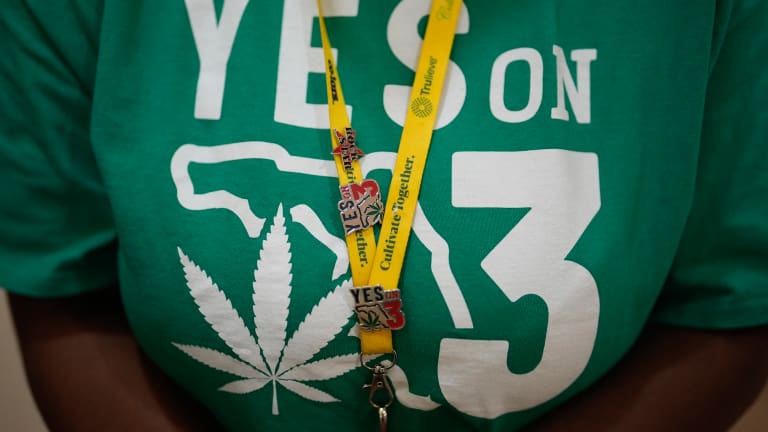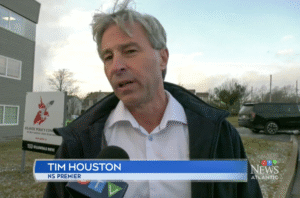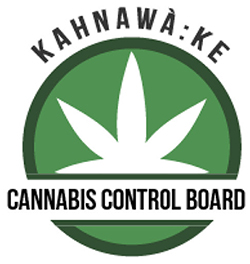Voters in four states will decide whether to legalize marijuana for personal or medical use in the Nov. 5 election
From ICT News by Mary Anette Pember November 3 2024
Four states have marijuana-legalization measures on the Nov. 5 ballot that could influence current and future plans for tribal cannabis and marijuana businesses.
Ballot measures in Florida, North Dakota and South Dakota — all of which already allow medical marijuana — would legalize recreational marijuana for personal use. Two proposals in Nebraska, which has no legal marijuana use, would open the door for medical marijuana.
The measures could drive up interest among tribes to develop marijuana enterprises or expand cannabis operations, but they also could cut back on customers for the existing enterprises if competition developed.
Chairman Peter Lengkeek of the Crow Creek Sioux Tribe isn’t too worried. The tribe’s dispensary has been lucrative for the South Dakota tribe and he expects it will continue to be successful.
“It has provided good revenue flow for us,” he told ICT. “We pull in people from across the state who come here because of the quality and variety of our product.”
In addition to owning and operating the High Plainz Dispensary in Fort Thompson, South Dakota, the tribe cultivates marijuana, using grazing and agriculture lands that were previously leased out. The tribe currently is cultivating about 13,000 acres of formerly leased lands.
“We took back our lands that historically were leased out for pennies allowing non-Indians to create generational wealth for themselves,” Lengkeek said. “We’re planting and harvesting our own crop. We have become more self-sufficient.”
Several South Dakota tribes operate marijuana medical dispensaries but some also offer recreational marijuana to tribal members who are 21 years and older. That service is extended to all enrolled members of federally recognized tribes.
Tribes and marijuana
Many tribes have decriminalized or legalized marijuana on their lands.
According to the National Organization for the Reform of Marijuana Laws, known as NORML, there are nearly 60 tribally owned cannabis retailers nationwide, with tribes operating businesses in nine states including California, Michigan, Minnesota, Nevada, New Mexico, New York, North Carolina, South Dakota and Washington.
Marijuana remains illegal at the federal level, however, and is classified as a Schedule 1 drug alongside heroin. Although tribes are subject to federal marijuana laws, the Department of Justice has mostly turned a blind eye to tribal marijuana businesses.
In 2013, under President Barack Obama, the U.S. Department of Justice issued what is known as the Cole Memorandum to U.S. attorneys stating that tribes have authority to regulate and legalize marijuana on tribal lands.
The memo essentially formalized a policy of non-intervention by the federal government relating to state marijuana laws for tribes. Although President Donald Trump rescinded the law in 2018, it had limited impact on Justice Department enforcement on tribal lands.
What’s ahead
South Dakota state Rep.Tamara St. John, a Republican who is chair of the South Dakota House State Tribal Relations Committee, said cannabis and marijuana operations can provide business opportunities for tribes.
“As an economic development endeavor, cannabis can be a real game changer for tribal communities,” said St. John, who is Sisseton Wahpeton Oyate.
Opening marijuana businesses, however, can be a large, complex undertaking for tribes that requires a significant financial investment. Tribes must update their law-and-order codes and unlike with other business ventures, banks won’t make loans to cannabis producers because of federal regulations.
Restrictions under the Indian Gaming Regulatory Act make using gaming profits to create and develop cannabis ventures challenging.
“Dealing with jurisdictional issues, especially on checkerboard tribal lands is also complicated,” she said.
St. John hopes, however, that legalization may help tribes address some of the legal gaps going forward.
Marijuana measures on the ballot
Here are the marijuana measures on the ballot in the general election on Tuesday, Nov. 5, 2024.
Florida
In Florida, Amendment 3, Marijuana Legalization Initiative supports legalizing marijuana for adults 21 years and older and allows individuals to possess up to three ounces of the drug. Florida voters approved the sale and use of medical marijuana in 2016 for those with a medical marijuana ID card. Currently, possession of 20 grams or less of cannabis in Florida is a misdemeanor punishable by a maximum sentence of one year and maximum fine of $1,000. Sentences and fines increase with the amount in possession, however, and possessing more than 20 grams is a felony. So far, tribes in Florida have not disclosed plans to open either medical or recreational dispensaries. But according to Mary Jane Oatman, executive director and chief operating officer of the Indigenous Cannabis Industry Association, many tribes are guarded about sharing their future plans regarding entering the cannabis industry. “Marijuana is still listed as a Schedule 1 drug; there is a lot of federal scrutiny around it,” she said. Oatman is a citizen of the Nez Perce Tribe. There are two federally recognized tribes in Florida.
Nebraska
Nebraska’s Initiative 437, Medical Marijuana Legalization Initiative supports legalizing the use of up to five ounces of marijuana for medical purposes for qualified patients. Qualified patients are those over age 18 with a written recommendation from a healthcare practitioner. Patients under 18 would be required to provide written parental permission in addition to a recommendation from a healthcare provider. Initiative 438, Medical Marijuana Regulation Initiative supports repealing penalties for possession, manufacture, distribution, delivering and dispensing of marijuana for medical purposes and would establish the Nebraska Medical Cannabis Commission to regulate the medical industry in the state. Currently, all marijuana activities are prohibited in Nebraska, and voters have rejected various attempts to legalize medical marijuana since 2015. Under current laws, the first offense of possession of one ounce or less is an infraction with a fine of $300, escalating to a misdemeanor for up to one pound and a felony for more than one pound. There are four federally recognized tribes in the state
North Dakota
In North Dakota, the Initiated Measure 5, Marijuana Legalization Initiative supports legalizing recreational marijuana, allowing possession up to one ounce of marijuana, 4 grams of concentrate and 300mg of edibles, and allowing individuals to grow up to six plants per household. North Dakota voters approved legalization of medical marijuana in 2016 for qualifying patients, but rejected legalization twice in ballot measures in 2018 and 2022. Currently, marijuana possession for consumption in North Dakota is a low-level misdemeanor carrying sentences from 30 days to 360 days depending on the amount and whether there is a prior offense. Possession for sale is a felony with a sentence of up to 10 years and maximum fine of $20,000. There are four federally recognized tribes in North Dakota.
South Dakota
South Dakota’s Initiated Measure 20: Recreational Marijuana, allows people 21 years and older to possess up to two ounces of marijuana as well as grow, ingest and distribute marijuana or marijuana paraphernalia. Currently, medical marijuana for those with a state medical card is legal. For those without a medical card, possession is a misdemeanor punishable by up to one year in jail and a $2,000 fine. Possession of more than two ounces is a felony. Similar amendments failed to pass twice before, in 2020 and 2022, and a survey co-sponsored by South Dakota News Watch found that most voters in South Dakota oppose legalizing recreational use of marijuana.There are nine federally recognized tribes in South Dakota.












Comments are closed.